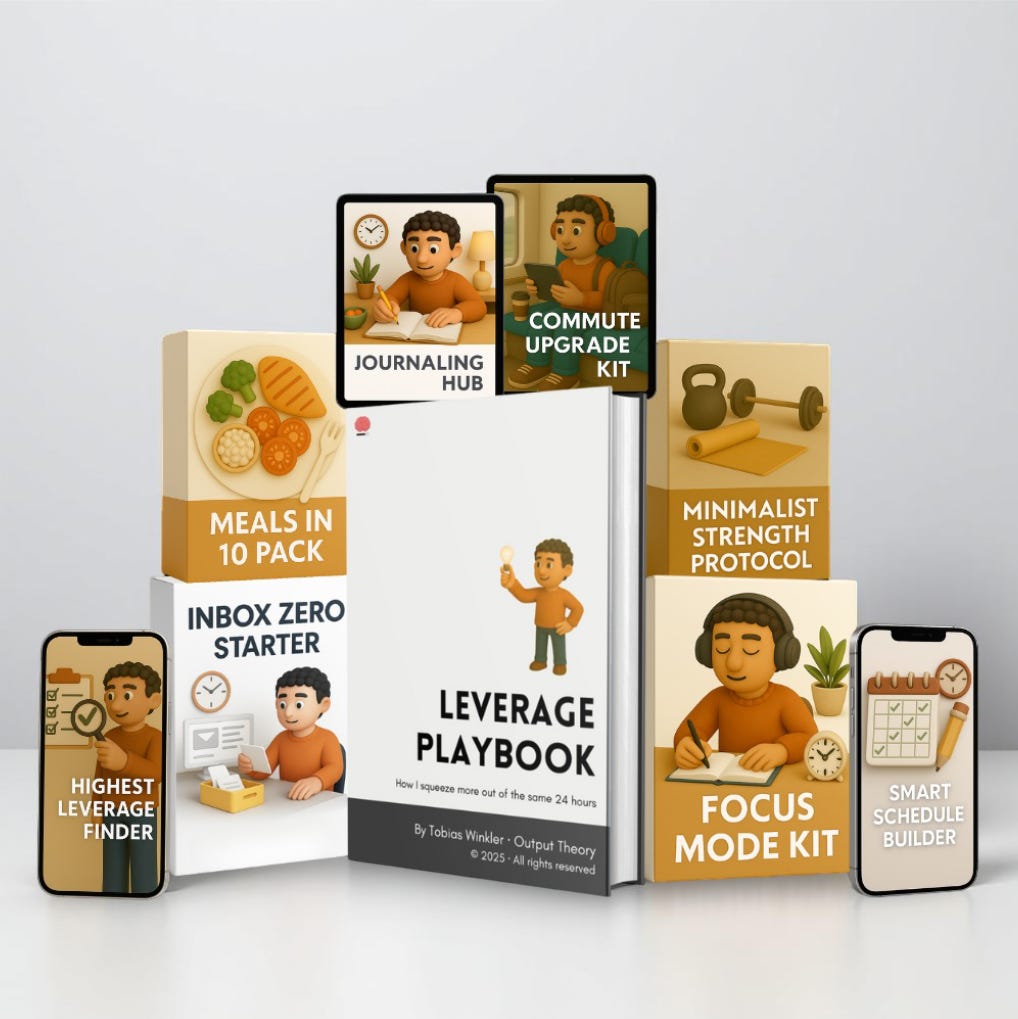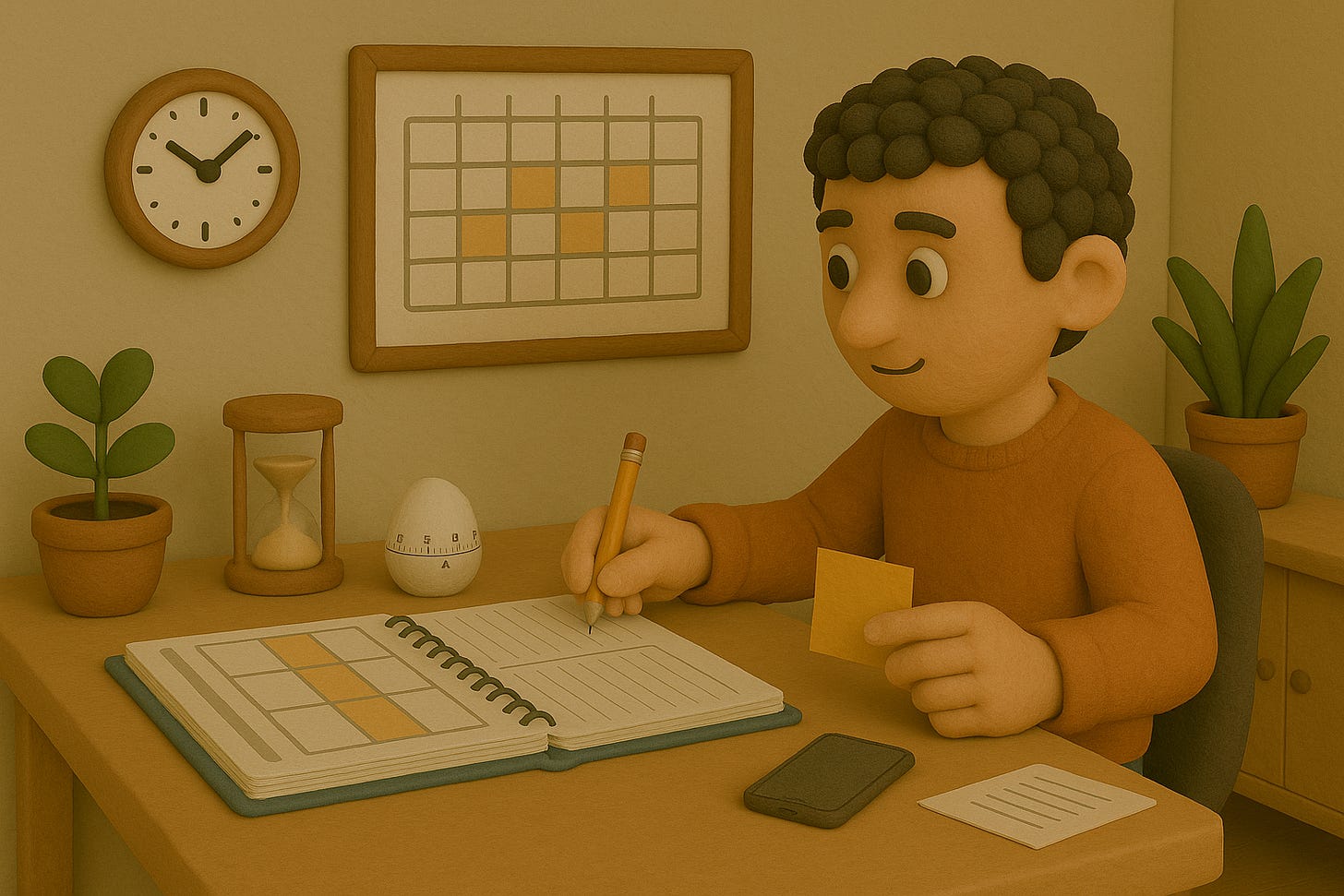How I Balance Full-Time Work, Full-Time Study, and Still Have a Life
My System to Fit More Into Your Day Without Burning Out
People often ask me:
“Tobi, how many hours do you have in a day? How do you fit everything in?”
The truth is, I don’t have more hours than anyone else. I just design my environment and habits so that the most important things get done.
It isn’t rocket science. It’s about consistently implementing a set of habits and designing my life and environment in a way that makes it easier to stick to those habits. Let me break it down.
My Daily Reality: Full-Time Work and Study
I’m a full-time software engineer specializing in banking software, which means I spend my days developing and planning solutions for financial institutions. I’m also a full-time computer science student.
And I’m not just trying to keep up; I strive to excel in both: leading high-impact projects at work and earning an academic excellence bonus at university.
Despite these demanding commitments, I still find time to socialize, travel, learn languages, hit the gym, cook, read books, and write a weekly newsletter.
At first glance, it might seem like an overwhelming schedule, but with the right systems in place, it’s entirely manageable. In fact, I believe most people could achieve a similar balance with the right approach. Here’s how I do it.
In response to popular demand I bundled the exact system I use to balance full-time engineering, full-time university, 5×/week training, Japanese, this newsletter and more.
What you get (core):
Leverage Playbook (PDF/eBook) — my operating rules & tools
Focus Mode Kit — one-tap deep-work on iOS/Android/macOS/Windows + blocklists
Inbox Zero Starter — copy-paste Gmail/Outlook filters that clear the noise
Smart Schedule Builder — turn goals into a weekly calendar that survives reality
Highest-Leverage Finder — pick the one task that actually moves the needle
Launch bonuses (first 50 buyers only): Journaling Hub (Notion), Commute Upgrade Kit, Minimalist Strength Protocol, Meals-in-10 Pack. Bonuses aren’t sold separately.
Productivity Gains Guarantee: If you complete the steps laid out and don’t feel you’ve gained at least 5 extra hours of productive time back, message me for a full refund.
→ Start your Output Sprint (get the kit)
The Core Principle: High-Leverage Activities
The guiding principle for me is simple: find the highest-leverage action in every area of life, then execute it with focus.
Work: I carve out deep work sessions. Two hours of uninterrupted work beats eight hours of half-distracted Slack chats. I start by asking: What’s the one part of this project that moves the needle most? Then I zero in on that.
Study: I don’t attend lectures. Instead, I self-study with active recall and spaced repetition. Two hours of focused review beats a day of passive note-taking.
Fitness: If you only have three workouts a week, you don’t waste time on curls. You do compound lifts—squats, deadlifts, bench. They cover the most ground in the least time.
Language learning: At the beginning, it’s vocabulary mass-building. Later, immersion. Always the highest-leverage step for the stage I’m in.
The formula is the same everywhere: pick the most important 20%, execute it with ruthless focus, and ignore the rest.
Sharpening the Axe: Preparation is Key
One of the most important lessons I’ve learned is the value of preparation.
As the saying goes:
“Give me six hours to chop down a tree, and I will spend the first four sharpening the axe.”
This principle has been instrumental in helping me manage my time effectively.
For instance, I dedicate specific blocks of time to planning my week. This includes mapping out my work tasks, study goals, and personal activities.
By doing so, I ensure that every hour is used productively, and I avoid the stress of last-minute scrambling.
See my post here for more information on this topic.
My System for Balancing It All
Here’s what it looks like in practice:
1. Design Your Calendar, Don’t Wing It
I try to schedule fixed blocks in my calendar. Every block of time has a purpose. I schedule study, work, gym, and even downtime. If you leave it empty, the hours will fill themselves with unproductive time.
When you do this for a week, I think you’ll be surprised how much time you have left over.
2. Treat Learning Like Compound Interest
I do a little each week, never cramming. Consistency beats intensity. A year of steady active recall adds up like compounding returns. Even making a habit of doing something just for a little while every day can have outsized returns.
3. Kill Distractions at the Root
I use a physical timer, put my phone in another room, and attack tasks in bursts. One hour of deep focus is better than three hours of half-working.
“Work like a lion, not like a cow”.
4. Use Commutes and Margins
Commuting is often seen as wasted time, but it doesn’t have to be.
Whether you’re on public transportation or driving, there are plenty of ways to make this time productive.
I use train rides to study for university or learn Japanese using flashcards. Driving is for audiobooks or immersion. Those hidden hours compound into real progress over time.
5. Always Start with the 20%
In every area—work, study, fitness—I start by asking: What’s the single highest-leverage thing I could do here?
Then I do that and let the rest go.
Personalizing Your Approach
While the principles I’ve shared are universal, it’s important to tailor them to your unique circumstances.
For example, when it comes to studying, I prefer self-directed learning using online resources rather than attending lectures. This allows me to set my own pace and focus on the material that’s most relevant to me.
However, this approach might not work for everyone, and that’s okay. The key is to find what works best for you and stick to it.
The Real Takeaway
Balancing work, study, and life isn’t about grinding 18-hour days. It’s about focus, design, and consistency.
Most people will tell you to “just work harder.” I say: work on fewer things, but the right ones.
It’s the same in almost any area. If you consistently do the highest-leverage work in focused bursts, and you let those results compound over time—you’ll look unstoppable.
Not because you had more hours in the day. But because you used the same 24 better than most.
Ready to plug this in?
The Output Sprint Kit gives you my exact stack to protect deep work, kill inbox noise, give you time back and make progress automatic.
Bonuses included for the first 50 buyers only.
→ Get the kit — Productivity Gains Guarantee.
Personal Note
This is not something you have to do. Not even something I would recommend to anyone.
It’s perfectly fine to have “unproductive time”, where you are simply relaxing, enjoying life or chatting with loved ones.
In fact, I wouldn’t call that unproductive at all.
The above are simply the systems and shifts that allow me to fit in more into my schedule, and the things that I personally found helpful.
In the end, the most important thing is that you enjoy whatever it is that you are doing, and not chase some arbitrary productivity goal just for the sake of feeling busy.
Thanks for reading :)
Until next time.
— Tobi
👉 Question for you: What’s the highest-leverage thing you could do this week, if you ignored everything else?
Resources
For a full list of all the tools and tactics I use to save time, check out my “START HERE” post here:






Great post.
As a fellow student and Substack writer, it covers most of it
I love the calendar part.
I realized that when I find the amount of time I have vs the amount of time I need, I always have extra time. The problem is that that time doesn’t add up, you get distracted by social media, books, and many more. The key to solving these problems is to have a calendar and track the time you use, that way you can weed out those distractions.
I love the way you have scheduled your days with true intention and focus. Something I guide my clients to do as well. Very good article.